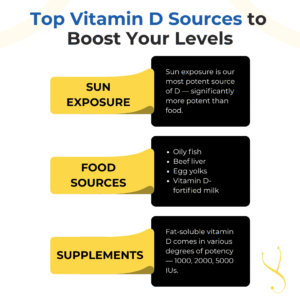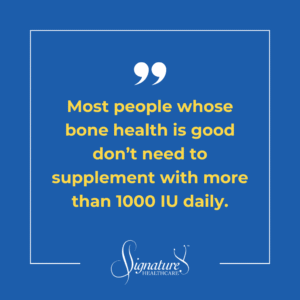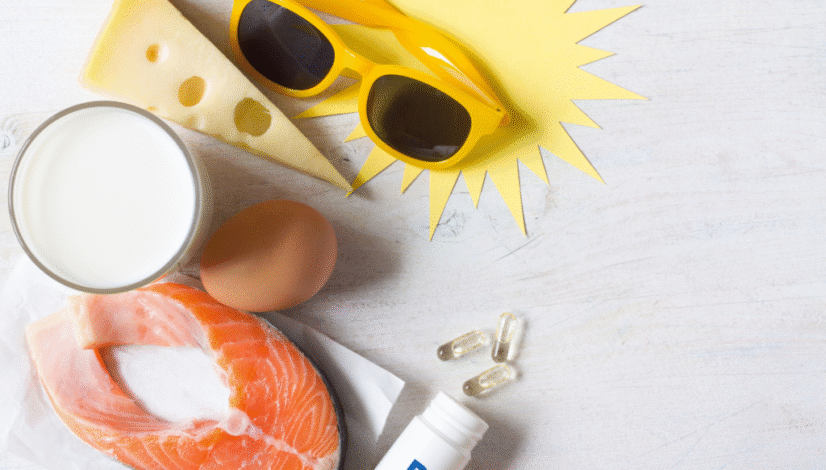Optimal Vitamin D Levels: How Much Do You Need?
Every few years, there’s a fresh wave of interest in vitamin D.
The medical community asks, “What is an optimal vitamin D level?” — assessing recommended levels and analyzing D’s role in our health.
For example:
- During the COVID-19 pandemic, scientists considered whether patients’ low vitamin D levels might contribute to poorer outcomes from the virus.
- D deficiency has been associated with a wide variety of illnesses and conditions, from heart disease, high blood pressure, and stroke to depression, osteoporosis, and certain cancers. If we routinely supplement a low vitamin D level, can we reduce a patient’s disease risk?
- Certain studies suggest a link between vitamin D deficiency and increased risk of dementia… but a lot more research is needed before we know if the two are actually related.
Answers are probably a long way off.
Frustratingly, in America today, lengthy, complex research is funded and driven by cash-rich pharmaceutical companies seeking rapid returns on their investment. There’s little money to be made from vitamin D studies, which tend to be done sporadically and under limited funding by government organizations.
Consequently, medical science still has a lot to learn about optimal vitamin D levels.

What’s an Optimal Vitamin D Level?
Given what we do know about vitamin D, is there a level considered normal for most of us?
“Normal” is subjective. Everyone’s requirements are different, and there’s no real standard.
For most individuals, the range of vitamin D in the body measures 30–100 nanograms per milliliter (ng/ML). But is 70 ng/ML significantly better than, say, 50 ng/ML? That’s not yet clear.
And it’s uncommon to routinely test most patients’ vitamin D levels. The United States Preventive Services Task Force says there’s insufficient evidence that regular vitamin D deficiency screening is worthwhile, except in patients diagnosed with very low bone mass.
Vitamin D from the Sun
Sun exposure is our most potent source of D — significantly more potent than food. In certain climates, exposing the face or arms to the sun for 10 minutes a day between 11 a.m. and 3 p.m. is enough to maintain essential vitamin D stores.
This is true even if you wear protective sunscreen. We’ve learned sunscreen doesn’t block vitamin D absorption from the sun — good news for people who conscientiously wear their sunblock.
But we’ve also learned that people with deeper skin pigment absorb vitamin D poorly from the sun, and that people in latitudes north of Atlanta — like Charlotte — can’t absorb enough D in the darker winter months.
Vitamin D From Food
Sun exposure is vital because it’s challenging to get enough vitamin D from food alone. But certain foods or fortified products can help.
While exact requirements differ from person to person, the Recommended Dietary Allowance of vitamin D for adults is 600–800 International Units (IUs) per day.
Best nutritional sources include:
- Oily fish (cod liver oil, swordfish, salmon, tuna, sardines)
- Beef liver
- Egg yolks
- Vitamin D-fortified milk (not an option for the lactose-intolerant)
Yet even these food sources won’t improve a true vitamin D deficiency. That typically calls for a vitamin supplement.
Vitamin D Supplements
There’s no “one-size-fits-all” approach, but a daily supplement can be a good way to assure you get the D you need — for example, in winter, when reduced sunlight in Charlotte tends to lower optimal vitamin D levels.
Fat-soluble vitamin D comes in various degrees of potency — 1000, 2000, 5000 IUs. Your need for a supplement can be based on factors like skin tone, age, and pre-existing health conditions.
Most people whose bone health is good don’t need to supplement with more than 1000 IU daily.
Be aware that even higher amounts can build up in your body over time. Elevated calcium levels from excess D can lead to kidney stones, vomiting, weakness, and frequent urination. Patients who choose dosages higher than 5000 IU daily should periodically request the special blood test to monitor for toxicity.
If you have an identified D deficiency, your concierge doctor can recommend a dosage that brings you up to optimal vitamin D levels.

We’re Always Here to Advise
Your Signature Healthcare physicians are here to conduct your annual physical, monitor your health, guide you in essential nutrition, and advise you when a dietary supplement like vitamin D may help.
We’d love to answer your questions.

Dr. Elizabeth Perry
Dr. Perry is board-certified in internal medicine, holding a medical degree from the Medical College of Virginia. She completed residencies in internal medicine at the University of Pennsylvania Hospital and in emergency medicine at Johns Hopkins Hospital. Dr. Perry served as the chairperson of the Health Services Committee for the Charlotte Chamber of Commerce in 2006-07 and received the Charlotte Business Journal’s “Women in Business Achievement Award” in 2006. She, her husband Jon, and their three children enjoy outdoor activities and travel.

